#Essay Concerning Human Understanding
Explore tagged Tumblr posts
Text
‘Midsummer at High Laver’: a return to an old poem of mine
We were out in Essex recently. My daughter is planning to get married and she wanted to look at wedding venues! I know. Things you do. I’ll give nothing away but just to say the trip was a success – the happy day will be in 18 months time. But while checking google maps as to how to get to the venue, I noticed that we were going to be driving near the village of High Laver. All sorts of bells…

View On WordPress
#All Saints&039; Church#Beneath Tremendous Rain#coming of age poem#compositional process#emotion#Essay Concerning Human Understanding#Essex#graveyard poems#heart v head#Henry Cecil Wyld#High Laver#how I wrote the poem#John Locke#literary tourism#parents in poetry#Percy Bysshe Shelley#rationality#Silbury Hill
0 notes
Text
unfortunately i am the kind of freak who reads philosophy for fun and then uses it to write fanfiction
#everyone pull out your copy of john locke’s an essay concerning human understanding#ur gonna need it for the goddamn maggot baby fic#this is possibly confirmation that at long fic is on the horizon
9 notes
·
View notes
Text

From John Locke’s An Essay Concerning Human Understanding
7 notes
·
View notes
Text

13 notes
·
View notes
Text
The acts of the mind, wherein it exerts its power over simple ideas, are chiefly these three: 1. Combining several simple ideas into one compound one, and thus all complex ideas are made. 2. The second is bringing two ideas, whether simple or complex, together, and setting them by one another so as to take a view of them at once, without uniting them into one, by which it gets all its ideas of relations. 3. The third is separating them from all other ideas that accompany them in their real existence: this is called abstraction, and thus all its general ideas are made.
John Locke, An Essay Concerning Human Understanding (1690)
0 notes
Text
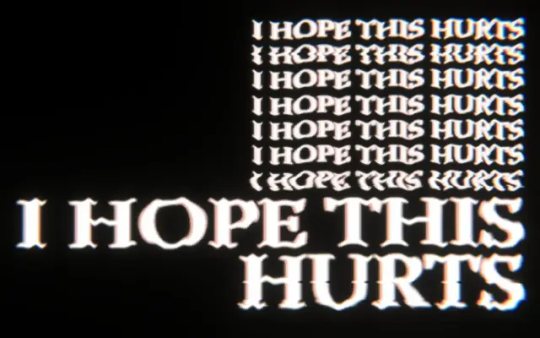
I saw someone ask what "I hope this hurts" means beyond the obvious, and I started to respond only for it to turn into an essay... Because I don't feel like dumping something so long in some unsuspecting person's notifs, I'm just going to post it here instead.
I started writing this after playing the game, but ended up watching a playthrough because I couldn't remember exactly where "I hope this hurts" was repeated. I think I caught the only few times it was mentioned, but I wouldn't be surprised if I missed something, so feel free to correct me on that or anything else I might have gotten wrong.
Spoilers for the full game and CWs for everything you would expect from discussing Mouthwashing apply.
Edited 10/16/2024 for clarity and some minor issues with formatting. I added sections in hopes of making it more readable, as well as a few more screenshots that I hope will support my points better. *Indicates where I made potentially significant additions to my original analysis.
Part One: Jimmy
Jimmy is someone who has a delicate ego. This means that he's very concerned with how he's perceived by those around him. We see this in how he responds to Curly and the news of the company's closure, which he takes it as a personal attack in spite of it very clearly having nothing to do with him on a personal level.
For people like Jimmy, a threat to one's image (whether it's a matter of their perception of themselves or, maybe worse, the perception others have of them) brings intense emotional pain. Even though it's clear that Curly meant no personal offense, and likely saw more good in Jimmy than was actually there, Jimmy sees this as a great threat to his own image, and thus identity.
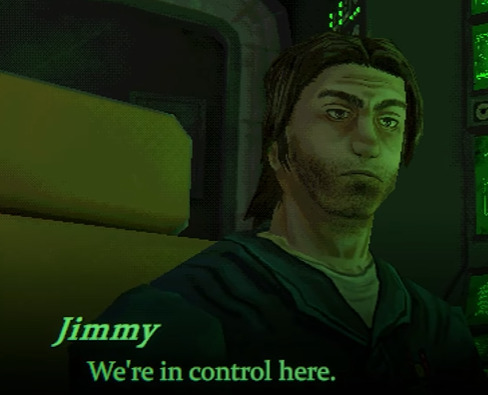
To be clear, it's not just that Jimmy thinks Curly is looking down on him. It's also that Jimmy needs his role in the company to maintain his image, and he needs to eventually become captain. This is his ultimate goal because the respect and control that someone like Curly has, in Jimmy's mind, is tied to the title he possesses. And Jimmy wants that. He wants respect, he wants to be listened to, he wants power over others. (This is also why Swansea's final speech is so important, in relation to the belief that if one just reaches this next goal, they might feel a little more human, a little more in control, a little more fulfilled, but as Swansea shows us, that's just not the case. And it's true for Jimmy, too. Jimmy isn't magically fulfilled by obtaining the title of captain.)
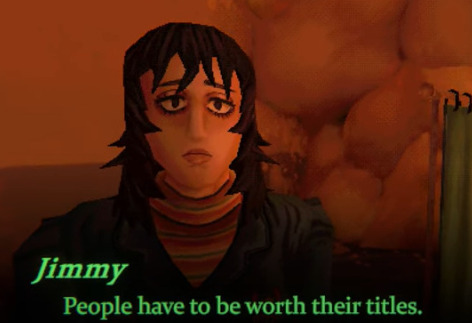
But in the beginning, Jimmy has yet to realize that just getting the role of captain won't magically make him a man who is respected, or even a man who is truly in control. He sees no opportunities for himself on earth. The only option is to stay in this company and become a little lord of his own ship... and suddenly that's ripped out from under him. He will never reach the goal he's been chasing for all of this time.
Anya telling him about her pregnancy is the final push he needs to go over the edge.
Part Two: Captain
Returning to the initial reveal that the company is shutting down for a second, I think it's important to keep in mind a few things:
1. The importance of the title of captain in Jimmy's mind.
2. How this extends to his perception of Curly, him being the current captain.
3. Jimmy's self-centeredness preventing him from understanding the feelings and perceptions of those around him.
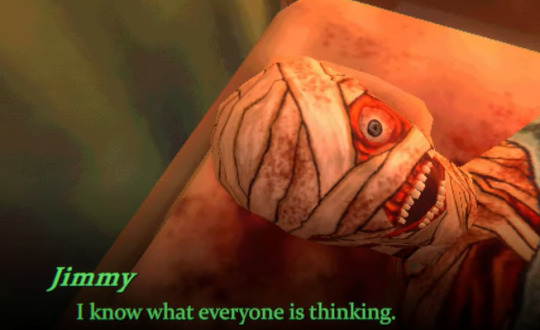
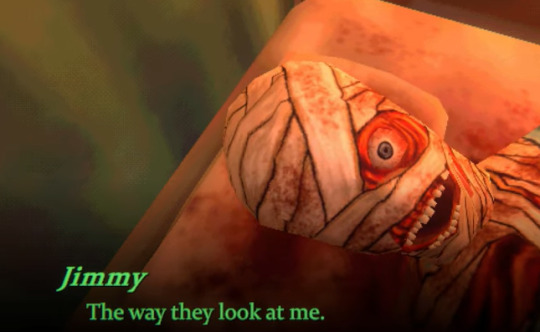
When Curly says what he does, Jimmy immediately jumps to the conclusion that Curly sees himself as above everyone else (and most importantly, as above Jimmy), to the point of considering them "dirt." I don't think Jimmy is just projecting his greatest fear (being seen as lesser) onto Curly. I think he's projecting his own perceptions.
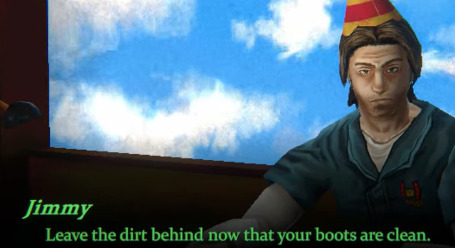
He's placed all of this importance on the title of captain, and thus Curly. The captain is above Jimmy. Jimmy is beneath him, is lesser. And we know how Jimmy treats those he sees as lesser (first Anya, and then the rest of the crew once he's captain, *manipulating Daisuke into putting his life at risk because Daisuke, who is just an intern after all, just isn't important to Jimmy being an example).
I think this is a fair reading because Jimmy does something similar with Swansea when he insists that Swansea is keeping the last cryostasis pod for himself. I understand some might say that this is just Jimmy's attempt to manipulate Daisuke and Jimmy doesn't actually believe it, which is a fair interpretation, but I sincerely think he believes what he's saying in this instance. And I think that because Jimmy sees selfishness as common sense. It's what he would do were he in Swansea's position, and what makes him giving the pod to Curly significant.
Part Three: Anya
So, Jimmy is already hurt and panicking. He sees his chance at power and thus fulfillment slipping away. And then Anya tells him that she's pregnant.
Anya, who he has shown time and time again that he thinks little of.
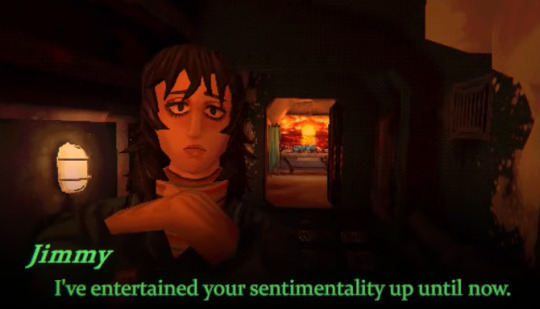
Anya, who he clearly sees as beneath him.
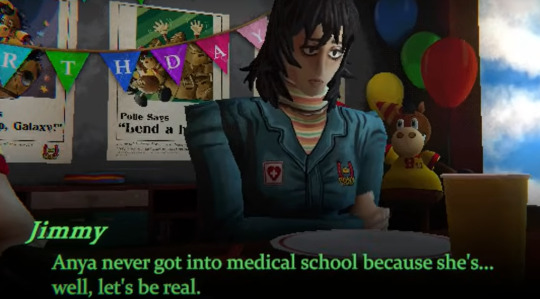
Any mention of the pregnancy, no matter how gently it was worded, would immediately feel like a threat to him on multiple levels. And not only that, but a threat from someone lesser than him. His image, his status, his control, his power—it's already slipping from his fingertips. *It's happening right then, in that moment. It's not just a potential future where he's held accountable in a real way (maybe if Anya involved authorities, or if Jimmy was legally responsible for supporting a child once they returned to earth). It's happening now, because his image is crumbling.
For this reason, I believe I hope this hurts to be directed at anyone and everyone that he sees as "threatening" him.
Anya and Curly have made him hurt. He wants to make them hurt.
He doesn't care about Daisuke and Swansea. If anything, he's so caught up in himself and this contorted vision of reality, I wouldn't be shocked if he convinced himself in the moment that they, too, were looking down on him for some reason. (See again, "I know what everyone is thinking. The way they look at me." Obviously this is said in the midst of his spiral, after the crash, but I wouldn't doubt the paranoia was there before that moment.)
He wants to make them hurt as they've hurt him. He may also want to make himself hurt in order to vent out his emotional pain. If not, death may simply be the easiest way to escape pain and the threat the future holds in his mind.
*Part Four: Without the Guilt
In addition to all of this, I think crashing the ship (making them hurt) is his vision of what Curly has done or is doing to him. This is how he "leave(s) the dirt behind."
To understand this, I'm going to include the birthday conversation and the conversation between Jimmy and Curly about crashing the ship.
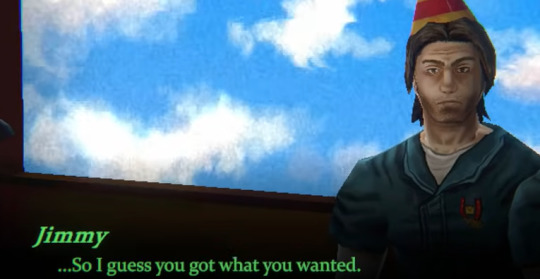
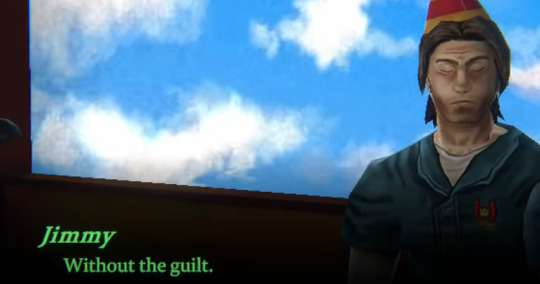
Jimmy: ... So I guess you got what you wanted. Without the guilt. Curly: Jim... If I had known... Jimmy: I can go back to my, how'd you put it? "Struggle of a life?" Jimmy: Anya never got into medical school because she's... well, let's be real. Jimmy: And how many employment years Swansea got left in him? Jimmy: Daisuke will be fine, mommy and daddy have him covered. So there's that at least. Jimmy: But you. Headed for bigger and better, right? Curly: I'm just... I'm just working on my life being a place I don't have to fucking escape! That's what I was trying to tell you, nothing mor- Jimmy: We're the ones you're trying to escape! Leave the dirt behind now that your boots are clean! Curly: That's not what I meant. Jimmy: It is what you meant. Jimmy: You just couldn't frame it to yourself in a way that kept you as the hero. Jimmy: Abandon the crew but remain the model captain.
To me, this is one of the most important and revealing sections of the game. Jimmy is not only projecting onto Curly, he's telling us exactly what he's going to go on to do (or attempt to do) when he becomes captain.
In addition to this, we see his manipulation on full display as he twists Curly's words and won't allow him even a moment to truly speak beyond a few lines he manages to get in between Jimmy's ranting.
That's not to mention we see the beginning of yet another pattern in Jimmy's behavior: getting a person to admit their weakness, then using it against them and/or using it to hurt them (he does this with Daisuke, for example, when he hears Daisuke's fears/desire for approval and proceeds to use it to get Daisuke in the vent). Here, Curly speaks about feeling trapped. Jimmy will soon trap him in a crashed ship just as much as he traps him in his own body, which Jimmy will proceed to drug. But I'll return to that.
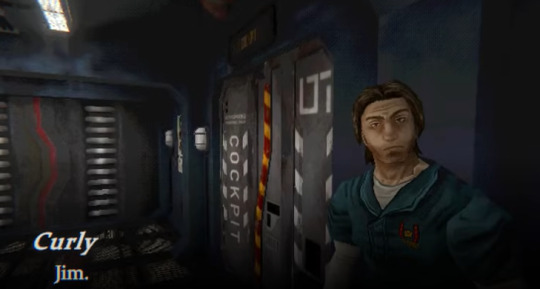
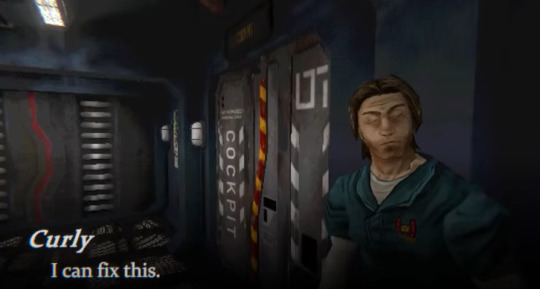
Curly: Jim. I can fix this. Jimmy: What do you think will happen when we get back? Hm? Curly: We can figure all of this out. You and me. Take care of it. Kills ninety nine percent. Jimmy: All I ever hear is how great of a leader you are. God, it's so annoying. Jimmy: But, now... What do you think will happen now when we get back? Curly: We'll fix this together. Jimmy: Everything you and I worked for in our lives. Accomplishments, changes. Jimmy: None of it will matter. Curly: You've gotten through difficult situations before. This time won't be any different. Work through it, one day at a time. Jimmy: It's not just me, is it? Jimmy: You were supposed to be the one who had everything under control. You said so yourself. Jimmy: The ship, this crew, everything that happened here... Jimmy: This was your responsibility, Captain. Jimmy: That is what you'll be hearing the rest of your life. Take responsibility. Jimmy: Or this can all be remembered as a tragedy. Jimmy: Despite what must have been the best efforts of its acclaimed captain. Jimmy: The Tulpar crew was never found. Jimmy: No one survived to tell the tale. Take responsibility. Jimmy: You're standing at the top. Jimmy: Feet in cement. Jimmy: I get it now. Right? Curly: ... Curly: ... Right.
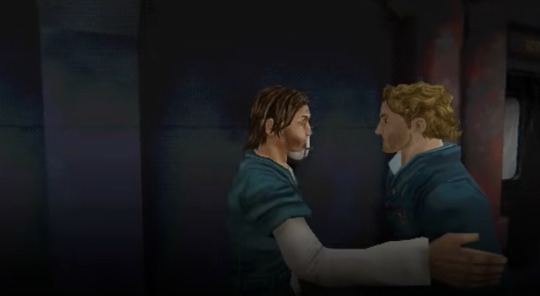
This is an important moment, because aside from the scene in which Jimmy is approaching Curly while he's on fire, it's the only other time that I can recall the game separating from their perspectives to allow us to see them both, standing together.
We see a flash of Take care of it. Kills ninety nine percent. Jimmy begins to pull away. Another flash. He continues to draw back. Another. He turns towards the cockpit.
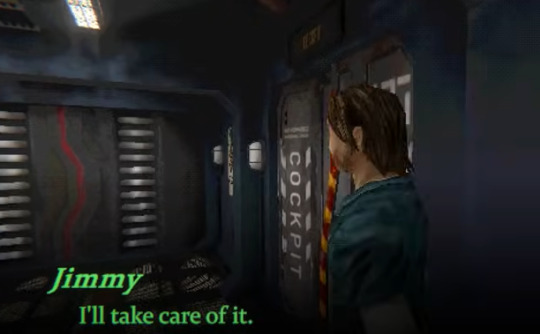
Jimmy sees through Curly. He sees Curly's worst where Curly sees only Jimmy's best, and he's more that willing to use that against Curly.
He sees a man who is not going to do what's hard. He sees a man who is going to try to "fix it" only in the most superficial sense. A man who confuses the appearance of cohesion and peace with the reality of it. Someone who sees the rocking of the boat as a manifestation of taking action against a wrong rather than the wrong itself.
In the end, it seems they're both ruled by appearances. And Jimmy will soon rip appearances in every sense from Curly's fingertips. He will make him hurt. He will get his revenge. He'll turn Curly into the villain, taking away his title, his respect, and his very face.
For daring to look down on him, Jimmy will turn Curly into dust.
But I think these words—I hope it hurts—come back to haunt him.
Part Five: The Eye as a Mirror
Like I said, I went back to try to find each time the phrase is used. There's the beginning, of course, but then there's the pregnancy sequence, for lack of a better name.
When the Polle monstrosity emerges from the giant uterus (?), we see these words:












In this sequence, we see a lot of different images and concepts connected: Anya's pregnancy and thus her sexual assault by Jimmy are tied to Polle and the company. The emergence of the Polle monster from the giant uterus (and the idea of the removal of the pregnancy) is tied to the mouthwash, as it's an act of "cleansing." This is all then tied to the phrase I hope this hurts.
Unless I missed something, these are the only two moments when the phrase is used: When Jimmy crashes the ship, and when he's experiencing this hallucination.
All clean! Really gets rid of that bad taste in your mouth, huh? Through wreckage! Through silence! Wash it away! All day fire fresh!
"Clean" is important immediately. "Leave the dirt behind you now that your boots are clean," Jimmy says. Because in this accusation is Jimmy's actual intentions himself. He wants to rise above others and clean himself from their filth. Now, he wants to clean himself of his sins.
I think "Really gets rid of that bad taste in your mouth" is mocking him. A direct challenge to the thought that he could ever truly be "cleaned," at least in the ways he's so desperately trying to go about it. *Not to mention how this connects to the mouthwash, as it might get that 99%, but there's always going to be 1% left.
"Through wreckage" obviously refers to the wrecking of the ship, but also of their lives. All by Jimmy. Though I wouldn't doubt in his mind it connects to the wreckage of consequences (ie. Anya's pregnancy resulting from Jimmy's actions).
"Through silence" I feel connects back to Jimmy's attempts to keep everything quiet, both literally and figuratively.
"Wash it away" also has a mocking edge, as if stressing the foolishness of Jimmy's attempts to treat these very serious events as if it's all just "dirt" he can wipe off.
Finally, we see "All day fire fresh!" This line stresses the connection to the mouthwash, of course. It also calls to mind the concept of cleansing by fire. Important considering Curly.
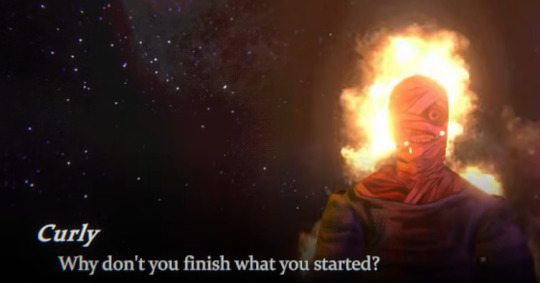
And after each, I hope it hurts. Jimmy's statement of pure, childish rage. His desperate desire to make others hurt as he hurts. To lash out, to get revenge. To have control until the very end.
This is also why Polle haunts him. Because he, as a man desperate for control, will always be under the thumb of the company even with that title of captain. That hurts him. And maybe the closest thing to ever recognizing the evil he's done to Anya is envisioning it as similar to the company's control, but even that feels like a mockery because he's so horrifically incapable of seeing her as a human being that she's been reduced to her womb. That's what he's really afraid of, in the end, and the fear feels like something else is in control. It makes the organ feel giant, larger than him, capable of hurting him.
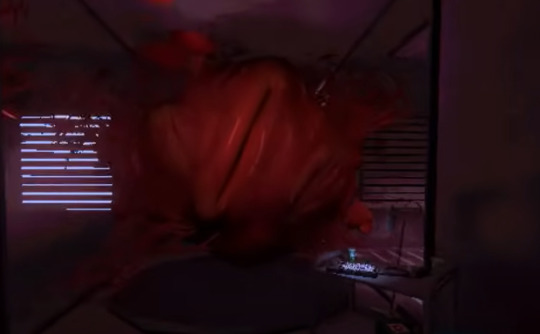
When I was watching the playthrough, I thought that there was going to be four or five "I hope it hurts." I thought it would represent each person Jimmy hurts, or all of them, because he hurts himself too. When the sixth came, I thought so much for that theory. But then, I thought about it and there's the fetus. That makes six.
So, I hope this hurts means "I want to hurt you the way I've been hurt. The way you've hurt me." It's Jimmy saying that if his life has been wrecked, he'll wreck yours. It's Jimmy saying he'll shut you up. It's Jimmy saying he'll burn everything down if it means he can maintain control, or even just the illusion of it.
Part Six: Pain
But I think there's another side to this. Like some of the other lines I said feel are mocking him, I think I hope this hurts turns against Jimmy, especially here. And more than that, pain (and by extension, pain medication) plays a massive role in the game, after all. So I hope this hurts feels as if it haunts every moment where it's involved.
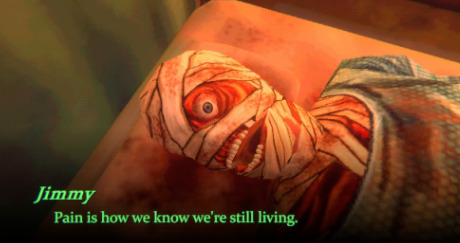
Jimmy says this the first time he gives Curly his pills. Pain is how we know we're still living.
The pills are clearly connected to death from the start. If "pain is how we know we're still living" then pain is connected to life and freedom from it is connected to death. That's saying nothing of Anya's use of the pills to kill herself. I think this connects back to the crash, as well. If life is pain, death is an escape from it.
I think it's also significant that the act of swallowing the pain pills is in and of itself painful.
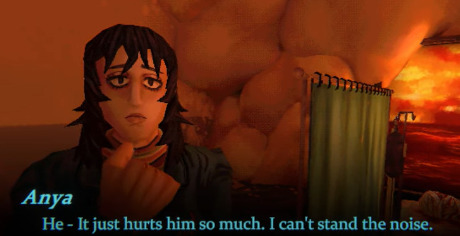
The pills that are meant to take the pain away become a method of torturing Curly. It's a way to make him hurt, and to exert control over him. Even something that should take away his suffering is just an extension of it.
At one point, Jimmy says "Once these are out, we'll have nothing to keep him quiet." In this sense, the pain pills are meant to suppress, not to heal (Through silence!). They're supposed to shut Curly up and keep him from expressing his anguish in the only way he has left (the noises that disturb Jimmy's sleep).
Others have compared this, or Curly's state, to how Anya has been forced to bottle up her own suffering. Jimmy is keeping them both quiet, or at least attempting to. The ultimate form of keeping them quiet would be to, of course, kill them all.
The pills can also be seen as an attempt to hide or conceal the hurt that has been caused rather than to actually heal. In this way, they're like the mouthwash: something that's not really helping, just covering up an issue (and thus making it worse). And the mouthwash represents Jimmy's attempts to "fix" things. He doesn't actually want to make things right, because that would mean taking accountability. He wants to protect his own ego by "fixing" things in a mimicry of Curly "fixing" things in which he wants to create a sense of "rightness" without actually adressing what (or who) has been wronged. Jimmy can't stand to look at himself, because he would see that he really is constructed of his worst moments, or at least, that's what I suspect he would see.
Conclusion
Considering all of this, I hope this hurts can then become a mantra about living in spite of everything. I hope this hurts means "I hope I'm alive in the end. I hope we're all alive in the end." It could mean "I hope I'm allowed to hurt, because I am hurt, and the harm that's been done to me must be seen rather than suppressed and hidden." It could mean "You can't keep me quiet. You can't ignore or hide what you've done to me."
Maybe most of all, I think it means I hope you reap what you sow. When it's turned back on Jimmy, when it's almost mocking or haunting him, it becomes in part about his emotional weakness. About his inability to look at himself and his reality without experiencing the pain of humiliation. I don't think he ever experiences half of the pain he's inflicted on those around him. Still, he has to deal with the fact that his attempt to hurt others instead of facing himself has caused him more pain rather than taken it away as he'd hoped.
And I think that's why he suddenly decides to make Curly a "hero" instead of a "villain." There's a tipping point where he's pushed into a corner. The pain is too much. He hasn't confronted his own actions in any real way, but he's done enough that he can't stand to save himself anymore. It hurts too badly to live with what he's done. It sends him into another stage of fantasy/delusion. The only thing left to do is what he intended to from the start: kill himself to escape and damn Curly to a slow death. Because to go on living in spite of the pain would be the right thing to do, in a sense. To live in the hell of his own creation. To face what he's done. But instead, he'll entrust those heroics to Curly.
This feels barely coherent in the end, so I might come back in a few days and say wow what the fuck was I talking about? But hopefully there's something here that captures some truth. Again, please feel free to correct me if I'm misremembering anything or if I missed something.
#mouthwashing#spoilers#tw#cw#most of the fucked up mouthwashing shit is mentioned here#idk how ppl are handling tws because are some considered spoilers?#idk
314 notes
·
View notes
Text
not to be such a boomer, but I think chatgpt is fucking this generation over, at least in terms of critical thinking and creative skills.
I get that it's easy to use and I probably would've used it if I was in school when it came out.
but damn.
y'all can't just write a fucking email?
also people using it to write essays ... i mean what is the point then?
are you gaming the educational system in pursuit of survival, or are you just unwilling to engage critically with anyone or anything?
is this why media literacy is so fucking ass right now?
learning how to write is learning how to express yourself and communicate with others.
you might not be great at it, but writing can help you rearrange the ideas in your brain. the more you try to articulate yourself, the more you understand yourself. all skills can be honed with time, and the value is not in the product. it's in the process.
it's in humans expressing their thoughts to others, in an attempt to improve how we do things, by building upon foundations and evolving old ideas into innovation.
scraping together a mush of ideas from a software that pulls specific, generic phrases from data made by actual humans... what is that going to teach you or anyone else?
it's just old ideas being recycled by a new generation.
a generation I am seriously concerned about, because digital tests have made it very easy to cheat, which means people aren't just throwing away their critical thinking and problem solving abilities, but foundational knowledge too.
like what the hell is anyone going to know in the future? you don't want to make art, you don't want to understand how the world works, you don't want to know about the history of us?
is it because we all know it's ending soon anyway, or is it just because it's difficult, and we don't want to bother with difficult?
maybe it's both.
but. you know what? on that note, maybe it's whatever.
fuck it, right, let's just have an AI generate "therefore" "in conclusion" and "in addition" statements followed by simplistic ideas copy pasted from a kid who actually wrote a paper thirty years ago.
if climate change is killing us all anyway, maybe generative ai is a good thing.
maybe it'll be a digital archive of who we used to be, a shambling corpse that remains long after the consequences of our decisions catch up with us.
maybe it'll be smart enough to talk to itself when there's no one left to talk to.
it'll talk to itself in phrases we once valued, it'll make art derived from people who used to be alive and breathing and feeling, it'll regurgitate our best ideas in an earnest but hollow approximation of our species.
and it'll be the best thing we ever made. the last thing too.
I don't really believe in fate or destiny, I think all of this was a spectacular bit of luck, but that's a poetic end for us.
chatgpt does poetry.
187 notes
·
View notes
Text
if more people in the community these days were able to take in the last paragraph and apply it to their immensely hardened views of their dynamic, i would be a happy camper. the way pb interacts with finn is far more consistent (for the lack of better term so far) than one would think otherwise, particularly in the way she speaks to him throughout the series. it was playful and forebearing at the very start because that was the nature of her in the beginning, and it remained that way until the finale.
then you have to take in all the big events that happen to them, bonnie falling into the well of power for finn to behold in front of her, their interactions after the climax of too young, many of the interactions between that episode and breezy that DONT concern the romance arc (this is especially important imo), her pulling the plug on her cctv system after she watches the screen that records his house, everything during and after the log cabin arc etc etc etc. the general nature of their interactions remain, obviously not without plot and character development to display. with their work-oriented, communal partnership in defending others, including themselves this might seem obvious, then again, its still made clear that they still care a great deal about their interests and each other- how much is shared between them. its truly an emotional one as well, stuff like going off the radar for three months thanks to ricardio will do that
the objective way to see those interactions with the knowledge of her not directly remarking on how she felt about the potential of them in a relationship is maybe that the writers wanted to rightfully move on from that plotline, even so, with her traits alongside the timeline of bonnie and finn together in mind, it isnt off to say that if she had really put it down, it wouldve been shown. i believe that way because theyre the most important relationship in the show, maybe franchise based on story progression. theyre endlessly influenced by each other and theres never a great amount of effort by them to maintain it since it comes very naturally to them. going back to the point, bonnie being candid about the whole thing would totally be a landmark in their lives for them to handle. i do still feel like theres room to explore this in any of the future installments later on
theres also the argument that she speaks to and about him as how an older family member would a younger one, but ive never really liked that interpretation. to me it sort of insulates that pb owes a great deal in finns happiness, and that is already a terribly widespread take because it breaks down the agency of and infantilizes each respective character. you gotta assume that two people are able to live off of more than mutual support.
i think its fair to say that Finn is absolutely an extremely important presence in Bubblegum's life, way more significant than she generally lets on at least earlier in the series, though it is supported when by the time of Pajama Wars she is going out of her way to just hang out with him and he seems to be just about one of the very few people PB is honest with or lets her defenses down around
but another big element of it, ironically, ties back to their relationship becoming unrequited pining on Finn's end. PB ended it by going 'oh, silly boy, that was YEARS ago!' when its unclear how much of that is her fucking around and not taking it seriously, especially when PB is often not entirely honest about her feelings.
It IS clear that at the time, she had been taking it seriously; she genuinely wanted to stay a kid and with Finn, though responsibility demanded otherwise. But it is notable that while she sort of implies its not a romance anymore at the time, she otherwise just sort of leaves it hanging and seems to be ignoring it, or trying not to think about it, and that IS extremely significant in the light of The Suitor.
This episode establishes that PB has no patience or interest in actual suitors of any kind, firmly rebuffing them and refusing any kind of flirtation. If they want to waste their time waiting in line to court her when she makes it clear its not going to happen, that's their problem. But with Finn, she doesn't do this. She doesn't encourage it, but she also doesn't just go 'NOT GONNA HAPPEN' in a direct sense.
Significantly, PB doesn't address it at all, and this is EXTREMELY atypical in her normal characterization. She is blunt and direct to a point that it is the reason she and Marceline originally broke up, and as we see in The Suitor she does not care for anyone courting her.
PB not addressing it at all is a notable outlier in her behavior, and being secretive about her feelings is a recurring motif (as we see with her and Marceline); this suggests that Finn is an extremely important person to her, and that she goes out of her way to avoid addressing them at all when normally she doesn't avoid it at all suggests that its all a huge complicated mess that may frankly concern her a bit.
the complex and uncertain nature of PB's feelings towards/about Finn raise a lot of questions because of how much of an outlier they are compared to the way she normally is; if you compare the way PB acts around Finn (very honest, kind of socially awkward) to the way she acts when acting in an official capacity around everyone else (usually bouncing back and forth between regal granduer and informal wackiness for comic effect, but always feeling in control and self assured) it definitely feels like she's sort of taking the mask off compared to how she acts otherwise.
#.txtril#adventure time#princess bubblegum#finn the human#fubblegum#i had to check if i still had this saved#so much of what i do these days is spend hours doing things that concern them#idk if ive mentioned it before but i do wanna make my own personal screenwriting bible sourced from metas like these#+ episodes from the show that include them#it would mostly be used to make writing my own works (original/fan) easier#but id still be an open book about it because theres things about them people just dont understand yet#another thing i had planned in case i never get over my writing funk is work on some sort of essay detailing their dynamic#not really in the vein of some other dissertations ive seen about them thats just far too narrow for their characters#like id hate to know how anyone who engages in pb/finn ship discourse would react to 500 days of summer#everything i see from that movie just points one finger to another person in the depicted relationship trying to defend the other#theres no middle ground to be seen which is exactly how this pairing is treated
40 notes
·
View notes
Text
Excerpts:
"The convenience of instant answers that LLMs provide can encourage passive consumption of information, which may lead to superficial engagement, weakened critical thinking skills, less deep understanding of the materials, and less long-term memory formation [8]. The reduced level of cognitive engagement could also contribute to a decrease in decision-making skills and in turn, foster habits of procrastination and "laziness" in both students and educators [13].
Additionally, due to the instant availability of the response to almost any question, LLMs can possibly make a learning process feel effortless, and prevent users from attempting any independent problem solving. By simplifying the process of obtaining answers, LLMs could decrease student motivation to perform independent research and generate solutions [15]. Lack of mental stimulation could lead to a decrease in cognitive development and negatively impact memory [15]. The use of LLMs can lead to fewer opportunities for direct human-to-human interaction or social learning, which plays a pivotal role in learning and memory formation [16].
Collaborative learning as well as discussions with other peers, colleagues, teachers are critical for the comprehension and retention of learning materials. With the use of LLMs for learning also come privacy and security issues, as well as plagiarism concerns (7]. Yang et al. [17] conducted a study with high school students in a programming course. The experimental group used ChatGPT to assist with learning programming, while the control group was only exposed to traditional teaching methods. The results showed that the experimental group had lower flow experience, self-efficacy, and learning performance compared to the control group.
Academic self-efficacy, a student's belief in their "ability to effectively plan, organize, and execute academic tasks"
', also contributes to how LLMs are used for learning [18]. Students with
low self-efficacy are more inclined to rely on Al, especially when influenced by academic stress
[18]. This leads students to prioritize immediate Al solutions over the development of cognitive and creative skills. Similarly, students with lower confidence in their writing skills, lower
"self-efficacy for writing" (SEWS), tended to use ChatGPT more extensively, while higher-efficacy students were more selective in Al reliance [19]. We refer the reader to the meta-analysis [20] on the effect of ChatGPT on students' learning performance, learning perception, and higher-order thinking."
"Recent empirical studies reveal concerning patterns in how LLM-powered conversational search systems exacerbate selective exposure compared to conventional search methods. Participants engaged in more biased information querying with LLM-powered conversational search, and an opinionated LLM reinforcing their views exacerbated this bias [63]. This occurs because LLMS are in essence "next token predictors" that optimize for most probable outputs, and thus can potentially be more inclined to provide consonant information than traditional information system algorithms [63]. The conversational nature of LLM interactions compounds this effect, as users can engage in multi-turn conversations that progressively narrow their information exposure. In LLM systems, the synthesis of information from multiple sources may appear to provide diverse perspectives but can actually reinforce existing biases through algorithmic selection and presentation mechanisms.
The implications for educational environments are particularly significant, as echo chambers can fundamentally compromise the development of critical thinking skills that form the foundation of quality academic discourse. When students rely on search systems or language models that systematically filter information to align with their existing viewpoints, they might miss opportunities to engage with challenging perspectives that would strengthen their analytical capabilities and broaden their intellectual horizons. Furthermore, the sophisticated nature of these algorithmic biases means that a lot of users often remain unaware of the information gaps in their research, leading to overconfident conclusions based on incomplete evidence. This creates a cascade effect where poorly informed arguments become normalized in academic and other settings, ultimately degrading the standards of scholarly debate and undermining the educational mission of fostering independent, evidence-based reasoning."
"In summary, the Brain-only group's connectivity suggests a state of increased internal coordination, engaging memory and creative thinking (manifested as theta and delta coherence across cortical regions). The Engine group, while still cognitively active, showed a tendency toward more focal connectivity associated with handling external information (e.g. beta band links to visual-parietal areas) and comparatively less activation of the brain's long-range memory circuits. These findings are in line with literature: tasks requiring internal memory amplify low-frequency brain synchrony in frontoparietal networks [77], whereas outsourcing information (via internet search) can reduce the load on these networks and alter attentional dynamics. Notably, prior studies have found that practicing internet search can reduce activation in memory-related brain areas [831, which dovetails with our observation of weaker connectivity in those regions for Search Engine group. Conversely, the richer connectivity of Brain-only group may reflect a cognitive state akin to that of high performers in creative or memory tasks, for instance, high creativity has been associated with increased fronto-occipital theta connectivity and intra-hemispheric synchronization in frontal-temporal circuits [81], patterns we see echoed in the Brain-only condition."
"This correlation between neural connectivity and behavioral quoting failure in LLM group's participants offers evidence that:
1. Early Al reliance may result in shallow encoding.
LLM group's poor recall and incorrect quoting is a possible indicator that their earlier essays were not internally integrated, likely due to outsourced cognitive processing to the LLM.
2. Withholding LLM tools during early stages might support memory formation.
Brain-only group's stronger behavioral recall, supported by more robust EEG connectivity, suggests that initial unaided effort promoted durable memory traces, enabling more effective reactivation even when LLM tools were introduced later.
Metacognitive engagement is higher in the Brain-to-LLM group.
Brain-only group might have mentally compared their past unaided efforts with tool-generated suggestions (as supported by their comments during the interviews), engaging in self-reflection and elaborative rehearsal, a process linked to executive control and semantic integration, as seen in their EEG profile.
The significant gap in quoting accuracy between reassigned LLM and Brain-only groups was not merely a behavioral artifact; it is mirrored in the structure and strength of their neural connectivity. The LLM-to-Brain group's early dependence on LLM tools appeared to have impaired long-term semantic retention and contextual memory, limiting their ability to reconstruct content without assistance. In contrast, Brain-to-LLM participants could leverage tools more strategically, resulting in stronger performance and more cohesive neural signatures."
#anti ai#chat gpt#enshittification#brain rot#ai garbage#it's too bad that the people who need to read this the most already don't read for themselves anymore
53 notes
·
View notes
Text
This is a powerful essay written by Rabbi Meir Soloveichik in 2003. I think it... meets the moment. It's 13 pages and I hope you will read the whole thing, but some key excerpts below (and at the very bottom, some responses from other Jewish scholars who - of course! - gave different opinions).
In his classic Holocaust text, The Sunflower, Simon Wiesenthal recounts the following experience. As a concentration camp prisoner, the monotony of his work detail is suddenly broken when he is brought to the bedside of a dying Nazi. The German delineates the gruesome details of his career, describing how he participated in the murder and torture of hundreds of Jews. Exhibiting, or perhaps feigning, regret and remorse, he explains that he sought a Jew—any Jew—to whom to confess, and from whom to beseech forgiveness. Wiesenthal silently contemplates the wretched creature lying before him, and then, unable to comply but unable to condemn, walks out of the room. Tortured by his experience, wondering whether he did the right thing, Wiesenthal submitted this story as the subject of a symposium, including respondents of every religious stripe. An examination of the respective replies of Christians and Jews reveals a remarkable contrast. “When the first edition of The Sunflower was published,” writes Dennis Prager, “I was intrigued by the fact that all the Jewish respondents thought Simon Wiesenthal was right in not forgiving the repentant Nazi mass murderer, and that the Christians thought he was wrong.” Indeed, the Christian symposiasts did sound a more sympathetic note. “I can well understand Simon’s refusal [to forgive],” reflects Father Edward Flannery, “but I find it impossible to defend it.”......
....Among Orthodox Jews, there is an oft–used Hebrew phrase whose equivalent I have not found among Christians. The phrase is yemach shemo, which means, may his name be erased. It is used whenever a great enemy of the Jewish nation, of the past or present, is mentioned. For instance, one might very well say casually, in the course of conversation, “Thank God, my grandparents left Germany before Hitler, yemach shemo, came to power.” Or: “My parents were murdered by the Nazis, yemach shemam.” Can one imagine a Christian version of such a statement? Would anyone speak of the massacres wrought by “Pol Pot, may his name be erased”? Do any Christians speak in such a way? Has any seminary student ever attached a Latin equivalent of yemach shemo to the names “Pontius Pilate” or “Judas”? Surely not. Christians, I sense, would find the very notion repugnant, just as many Jews would gag upon reading the Catholic rosary: “O my Jesus . . . lead all souls to heaven, especially those most in need of thy mercy.”
.....There is a wonderful bit of Jewish lore concerning the giving of God’s Torah, in which God is depicted as a merchant, proffering His Law to every nation on the planet. Each one considers God’s wares, and each then finds a flaw. One refuses to refrain from theft; another, from murder. Finally, God chances upon the Jewish people, who gravely agree to shoulder the responsibility of a moral life. The message of this midrash is that God’s covenant is one that anyone can join; God leaves it up to us.
Consider for a moment the extraordinary contrast. For Christians, God acted on humanity’s behalf, without its knowledge and without its consent. The crucifixion is a story of a loving God seeking humanity’s salvation, though it never requested it, though it scarcely deserved it. Jews, on the other hand, believe that God’s covenant was formed by the free consent of His people. The giving of the Torah is a story of God seeking to provide humanity with the opportunity to make moral decisions. To my knowledge, not a single Jewish source asserts that God deeply desires to save all humanity, nor that He loves every member of the human race. Rather, many a Jewish source maintains that God affords every human being the opportunity to choose his or her moral fate, and will then judge him or her, and choose whether to love him or her, on the basis of that decision. Christianity’s focus is on love and salvation; Judaism’s on decision and action.
The difference runs deeper. Both the Talmud and the New Testament have a great deal to say about the afterlife. Both ardently assert that it exists, and both assure the righteous that they will receive eternal reward and warn the wicked of the reality of damnation. Yet one striking distinction exists between these two affirmations of eternal life: only the Christian Testament deliberately and constantly links the promise of heaven with ethical exhortation, appealing to the hope of eternity as the incentive for righteous action. For Christians, every believer’s ultimate desire and goal must be to experience eternal salvation. Leading a righteous earthly existence is understood as a means towards attaining this goal. Jews, on the other hand, insist that performing sacred acts while alive on earth is our ultimate objective; heaven is merely where we receive our reward after our goal has been attained. The Talmud, in this regard, makes a statement that any Christian would find mind–boggling: “One hour obeying God’s commandments in this world is more glorious than an eternity in the World to Come.”
The contrast extends to differing ways of celebrating holidays. In speaking to Fr. Jim about our respective faiths, I told him about the phenomenon of “Yom Kippur Jews.” Many of my nonobservant coreligionists, I said, show up in synagogue only on the Day of Atonement and so experience a Judaism that focuses only on judgment and repentance. They never experience Judaism at its most joyous moments: Passover, Hanukkah, Purim. “I have the opposite problem,” said Jim. “Some people show up in church for Easter only—Christianity at its most joyous. And so they never think about judgment and repentance.”
Both rabbis and priests would appreciate regularly packed houses of worship; but the contrast between the central days of the Jewish and Christian calendars is instructive. Christians celebrate a day when, they believe, Jesus was given his place in heaven and so, at least potentially, was every member of humanity. Yom Kippur, in contrast, is not a day for celebration but for solemnity, a day for focusing not on salvation but on action. Jews recite, again and again, a long litany of sins that they might have committed; they pray for forgiveness, and conclude, time and again, with the sentence: “May it be Thy will, Lord our God, that I not sin again.” While the entire day is devoted to prayer, and to evaluation of past deeds, the concept of reward and punishment in the afterlife is not mentioned once. The only question of concern is whether, at the end of the day, God will consider us sufficiently repentant. Yom Kippur’s climax comes at sunset, during the neilah, or “closing” prayer. After begging once again for forgiveness, Jews the world over end the day with the recitation of “Our Father, Our King,” named thusly because of the first phrase in every sentence:
Our Father, our King, we have sinned before You. Our Father, our King, we have no king but You. Our Father, our King, return us in wholehearted repentance before You.
We ask God for mercy and for forgiveness, attributes of God that Judaism holds dear. But then our thoughts turn to the utterly evil and unrepentant. Towards the end of this prayer, one anguished, pain–filled sentence stands out: “Our Father, our King, avenge, before our eyes, the spilled blood of your servants.” After a day devoted to prayer, synagogues everywhere are filled with the cry of fasting, weary, exhausted Jews. They have spent the past twenty–five hours meditating upon their sins and asking for forgiveness. Now, they suddenly turn their attention to those who gave no thought to forgiveness, no thought to God, no thought to the dignity of the Jewish people. After focusing on their own actions, Jews turn to those of others, and their parched throats mouth this message: “Father, do not forgive them, for they know well what they do.”
Some responses: https://hakirah.org/ShurinArchive/DOC0188.PDF
134 notes
·
View notes
Note
What do you know- I'm trying out the askbox *eyes*
anyway I just wanted to say that high-key I think I'd follow any content you make at this point bc your art brings me so much joy. That doesn't tend to happen super often since i am,,,, very much so a hyperfixation-focused person HAHA
regardless I'm not exactly quiet about it but I adore your art and I look forward to each new time you post :D
I WISH i had the capability of pumping out art like you do bc man while I love to draw and have so many ideas all the time picking up the pencil is Hard Dude.
Also! In a recent post you mentioned the whole Twin Dragons AU and HC that people love to have- I'd be super curious as to your opinion on it!
-( ╹▽╹ )
I SEE YOUR TAGS AND IM.
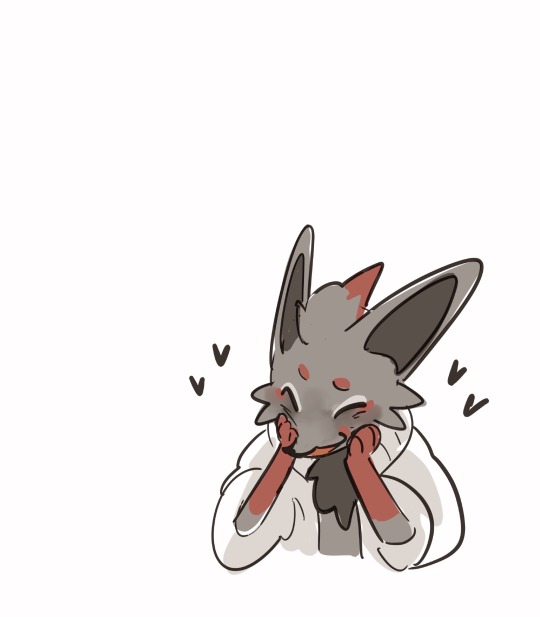
I’ll have to slow down at some point on that Submas Grind, but the hyperfixation throes are REAL. Thank you for inhabiting the tunnels with me! People that tag and cheer artists on are the real mvps of the art economy.
As for twin dragon aus!
I’ve always seen Emmet as more zekrom esque, and Ingo more reshiram esque. Is it cause the typing matches their starters? Maybe, hehe.
Ultimately though, the guys are too multifaceted for me to easily split them into truth and ideals.
I also see the legendaries as Eldritch Abominations Beyond Understanding, so having the dragons in my iteration become the twins would, uh, have consequences. The funny goofy story would dip into horror territory instead. (Reshiram demands only truths, and anything not Absolute will burn. And zekrom’s ideals are beyond human understanding, and trying to understand the mad tangle of thunder would drive somebody insane.)
(I’m a huge tma fan. Can you see it? Man.)
((Also N’s a scary mofo for summoning reshiram. I’m digging directly into the whole “twin heroes have a civil war and it destroyed unova” backstory that pokemon set up, and the more I think about it the stronger my dread mounts at the idea of Zekrom OR Reshiram casually flying overhead.
But this is also just how I see the legendaries of the pokemon world! Lugia sinks islands. Groudon covers towns. Arceus loves the mortal world, and mourns because its immortality only brings grief. Giritina hates, because it’s the ghostly remains of every one of Arceus’s mistakes given drive, banished into the distortion realm. Normal stuff!)
You sly dog, you got me monologing! But here’s the tldr: Not sure i’ll ever make my own serious Dragon AU that follows my internal world building for pokemon. I’m too attached to my favorite trope: “the smallest people can still initiate the biggest of changes”, and I’m too attached to my other favorite trope: “legendaries are actually gods and you Should Be Frightened.”
So that’s why, in this essay, if the trio gets turned into pokemon, I’d make them route 1 run of the mill rats. Because rats can do whatever they want.
(Plus, patrats and pachirisu aren’t banned from the subway battles last I checked.)
If i had to make a goofy crack dragon au though, I think this would be the result:
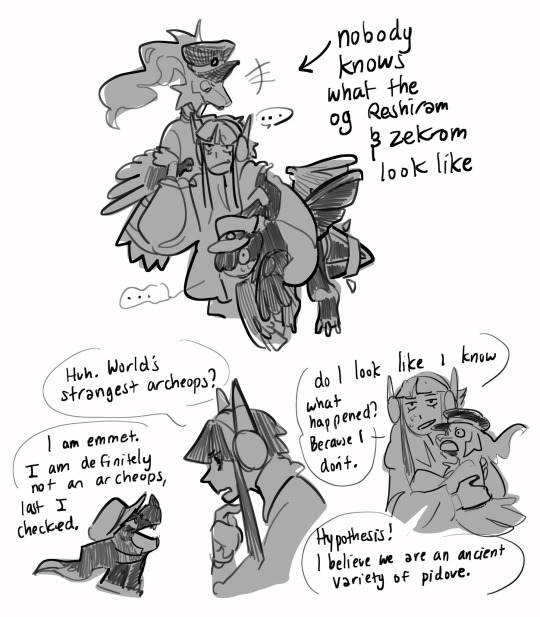
The whole story would just be the trio and historians trying to figure out what the hell the twins got turned into, and concerns of other people becoming pokemon as well. So far, people are convinced they’re a paradox version of an archen. (I mean…)
(Alternate take of THAT, where elesa gets turned into a victini.)
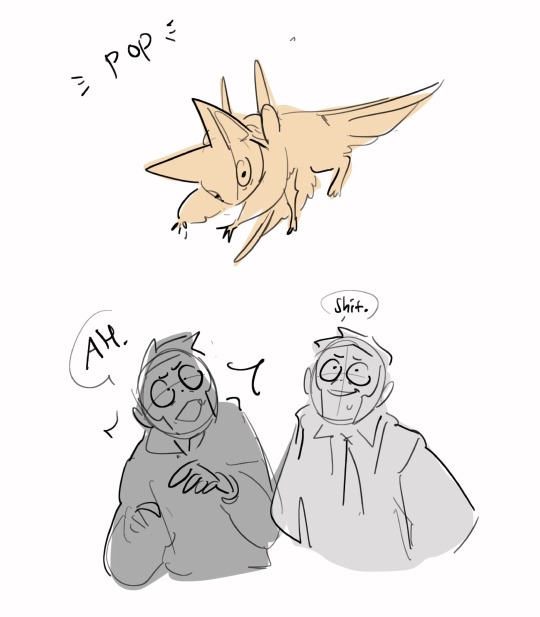
#long rambling talk under cut!#click at your own peril#ask#mailbox#i have feelings for forces of nature that shape the pokemon workd#benevolent gods. apathetic gods. malicious gods…. mMMz#pokemon#guess this counts as submas!#submas#nimbasa trio#my two hot takes on the twin dragons au#critterbitter#critterbitter screams into the void#myart
415 notes
·
View notes
Text
The Infamous "Durge Is a Man" Essay
I - INTRODUCTION
There's one simple question that led us to developing this theory: "would Bhaal want a female heir?"
Bhaal created Durge to be his ideal successor: the hand who would've reaped death in the world, conquering it in His name.
Every detail we get about Durge's lore is tied to this objective, the entire purpose of Bhaal's creation.
The cult is obviously shown to us as patriarchal, which is hinted at from the sole fact they worship a male deity: the argument may come off as silly at first, since one could argue Gods do not understand nor care for the concepts of gender.
It would be a valid counterpoint, if it wasn't for the fact Bhaal used to be a human, having navigated the world as a fully grown man before he eventually became a God.
If we believe he created Durge in his ideal image, it seems much more intuitive for his offspring to be male.
II - THE MATTER OF SUCCESSION
We must note that Bhaal's plans heavily rely (as we can read in Durge's "diary" tab) on reproduction ; e.g "siring lots of Bhaalspawn".
This alone isn't coded as one sex or the other but, if we think of it in terms of convenience, a female heir wouldn't be your first choice for the task: women can only gestate one child per year and conceive in very specific windows of time within their cycle, while men can potentially impregnate countless women in the same time span and not suffer any physical disadvantages during gestation.
We should also consider women tend to develop a bond with their newborn and the latter needs to rely on them for survival during the first few months of their life, while a man:
1. has no such obligations from a social point view (especially in a medieval context, where bastard children were the norm)
2. isn't strictly needed by the child for survival, biologically speaking.
I doubt Bhaal was expecting his heir to keep track of her cycle, gestate for nine months with all the drawbacks that come with it, give birth risking death and spend the following months caring for a newborn – all of this, on repeat for years if not centuries.
"But he's a God, he could potentially speed up the process!"
Technically true, but why would he go through such trouble, if he could craft his ideal child as a male and avoid complications?
The game itself seems to agree with this theory, since you get the "Bhaal's stallion" line regardless of your Durge's gender, in one of the bad endings.
We could also consider the idea that reproduction = power, "spreeding the seed", to be a typically patriarchal concept.
Bhaal himself isn't fond of the idea of raising children, as he let Durge be raised by an adoptive family – a "regular" one no less, meaning he didn't even concern himself with choosing one.
III - IN-UNIVERSE MYSOGINY
There are many aspects of the religion that seem to glorify manhood, and for its leader to be a woman (by Bhaal's choice, no less) seems inconsistent.
Let's think of the infamous blessing granted to Bhaal's favourites, the Ecstasy of Murder, which basically consists in a pseudo prostatic orgasm.
Then we consider the presence of predominantly-male sexual crimes, both coming from Durge and other important figures within the cult.
We cannot deny necrophilia, for functional reasons, is extremely uncommon amongst women: necrophilic acts are typically carried out by penetrating a dead body, as it's almost the only pleasurable act you can perform on a corpse ; Durge being a known necrophiliac pre-lobotomy could be one of the many hints the character is meant to be read as male.
Not to mention the horrendous way in which Bhaalist female characters are treated in-universe, between Sarevok sexually abusing his daughter (and this concept being treated as completely normal by the narrative, as far as we know of) and Orin being constantly belittled.
We never hear of any male cultists undergoing the same treatment, meaning abusing women is the norm amongst Bhaal's faithful – yet again, a telltale sign of a patriarchal religion.
"But Orin isn't mistreated because of her sex, she's mistreated because she's not the true heir!"
Orin is, indeed, not Bhaal's biological daughter: she's related to Him by blood, but as Durge himself says, her blood is "diluted".
However, while he acknowledges she's not his biological sister, he still addresses her as such in multiple sources, meaning the cult leader himself doesn't care about her actual origins.
She's constantly portrayed as someone who gets talked down to, cast aside and her beliefs are harshly criticized both by Durge and others influential members such as Sarevok.
For Larian to choose a woman to fill this role could have been accidental, but we must admit the symbolism is quite clear.
Orin interprets murder as a form of art, while her Bhaalist peers frequently accuse of her misunderstanding her own faith, considering her too immature to lead the flock.
She's the only Bhaalist female character we're shown as remarkable, and she's coincidentally used as an example of someone the cult does not respect ; she's even biologically related to Bhaal and yet, she had to seize power by force.
IV - ROMANTIC SUBTEXTS
Another interesting matter are the characters commonly paired with Durge in fanworks: Durgetash and Durgestarion are the most popular romantic pairings according to ao3, and we cannot blame the fandom for catching up on the subtext.
Durge's "admiration" (as he calls it himself) towards Gortash is viewed as controversial and arises suspicion in-universe, to the point he feels the need to apologize to his Father and repent for an implicit sin.
While it would be scandalous to fraternize with Gortash even in a platonic matter – he's practically the leader of the rival cult –, the emphasis put on justifying their interactions has been interpreted by fans as romantic subtext.
The letter in which Durge addresses the issue is titled "Letter for Forgiveness", despite Gortash only being mentioned at the beginning, while the rest of the letter focuses on different topics entirely.
Right after expressing guilt for the way he views Gortash, Durge proceeds to repeat Bhaal's plan and promises to follow it, stressing that he would have made his Father proud regardless.
The letter overall comes off as an attempt to justify being attracted to Gortash and reassuring Bhaal that it wouldn't come in the way of their plans, as it would pose an enormous threat otherwise.
Durge being attracted to Gortash – if we choose to interpret him as a man – would come with a handful of important challenges: first of all, sympathizing with the 'enemy', implying Durge could abandon the idea of betraying him or even allow Gortash to do the same to him.
Second of all, being capable of such vulnerability that would come in the way of being a sentient weapon: a killing machine isn't supposed to feel pity, let alone experience something as foolish as forbidden love.
And thirdly, for Bhaal's heir to prefer the company of men is simply a disgrace, as it would come in the way of reproduction and possibly undermine his public image.
While all of this may have not been meant as a homosexual allegory, the fact you can find the Letter for Forgiveness on Durge's corpse if you play as Tav, still comes off as "bringing a secret to the grave".
Not to mention the note at the end of the letter, written by another cultist, reading: "Ha! Orin was right about her sibling." which is clearly a jab at what we mentioned above.
When you go to confront Orin in Act III (as Durge) about the fact she has been following you around town, she replies: "The little lordling has been whispering in your ears? He always knew how to tumble and twist your mind matter, leaving you knotted in his chords."
The matter of Durge's attraction to Gortash is seen as something silly and shameful at the same time: it's an open secret cult members dare to joke about, because they find it ridiculous.
If a hypothetical female heir of Bhaal had the slightest possibility of reproducing with the Chosen of Bane, I'm pretty sure they wouldn't find it as humorous – they find it hilarious because it's taboo, a powerful demigod developing a "school crush" on a male ally.
We should also talk about some of the in-game implications about Gortash, such as being someone who possibly "slept his way to the top": managing to charm and daze a much more powerful man on purpose sounds surprisingly in-character.
What we find even more interesting are the implications that come with Durgestarion, a pairing the writers are openly fond of.
We know both characters were characterized by the same writer, the latter going out of his way to include personalized romance interactions between the two: unlike other characters, romancing Astarion as Durge gives the player access to tons of new dialogue lines and greetings, sometimes making for a completely new experience compared to romancing him with a regular Tav.
Some hints may point to Durge being the "canonical" romance for Astarion, as many fans have speculated ; while one may disagree with that sentiment, we must admit it's not far fetched.
If we consider all of Astarion's canonical past relationships (meaning, the few ones he actually deems important and genuine) were with men, and the emphasis put on Durge's "admiration" towards Gortash + the incessant pressure Bhaal puts on him to reproduce, the thought of these characters romancing each other in an alternative timeline actually sounds liberating.
Some Durge-specific lines Astarion says during his romance arc seem to be aimed at a male character, rather than sounding gender neutral: the first example that comes to mind is "Are you alright now, or is today a 'I will wed you with a delicate veil of blood blooming over your white curls' kind of day?"
Astarion sarcastically references Durge "wedding him", thus putting the player in a stereotipical "groom" role from the start, with the veil resembling the one brides typically wear during the cerimony.
If we consider all other aspects mentioned in this theory, the line reads as somewhat... male-coded.
If we want to be truly insane about this theory – and of course, we do – , we could even add a "gay allegory" element to the equation.
A vampire and the spawn of an evil deity, excluded members of society who'd usually feel a compulsion to hide, are implied to fall in love by the narrative.
V - ACTING CHOICES
Finally, we come to the voice actor: while a specific actor was chosen to play the character and is regarded as the iconic Durge VA, Larian didn't concern themselves with choosing a female voice actor to include the possibility of a female Durge, which is why we can only hear his intro in Neil Roberts' voice.
VI - CONCLUSION
With all of this taken into account, a female Durge seems to be an after-thought, if not directly a fantasy or a headcanon that the game gives you the possibility to play out.
The original narrative, as we can see, best accomodates a male character.
#baldur's gate 3#baldur's gate iii#bg3#bg3 companions#the dark urge#durgetash#durgestarion#bg3 durge#bg3 gortash#enver gortash#orin the red#bg3 orin#larian critical#bg3 discourse#bg3 tav#bg3 astarion#astarion romance#astarion analysis#lord enver gortash#bg3 sarevok#sarevok anchev#tav x astarion#male durge#female durge#chosen of bhaal#bg3 headcanons#bg3 lore#act iii#bg3 act 3#bg3 act 1
129 notes
·
View notes
Text
watching a video on Arcane ("how Arcane was always centrist - even before s2") but the definitions early on for different political ideologies is making me appreciate TDP more
For example, right-wing / conservatism is being defined as "it supports maintaining the status quo, and find social inequality and hierarchal society to be inevitable and natural. The right values order, social cohesion, and patriotism. The right is also associated with reactionary politics, which desires to see society revert back to its previous political state / status quo."
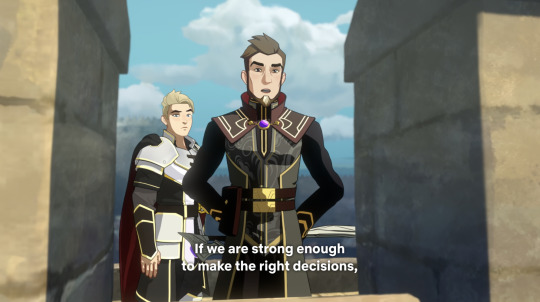
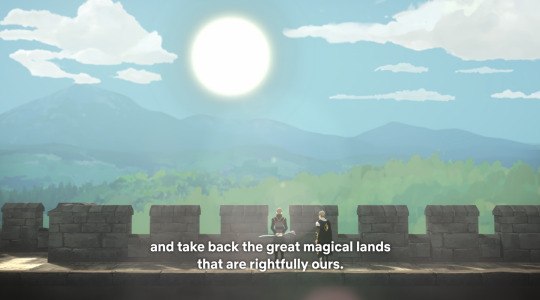
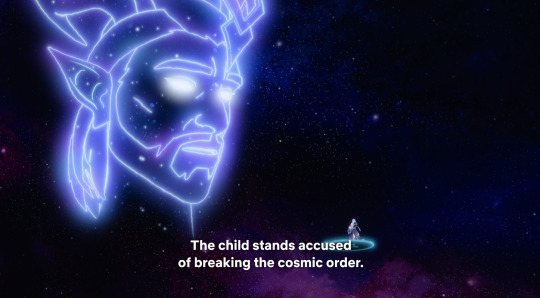

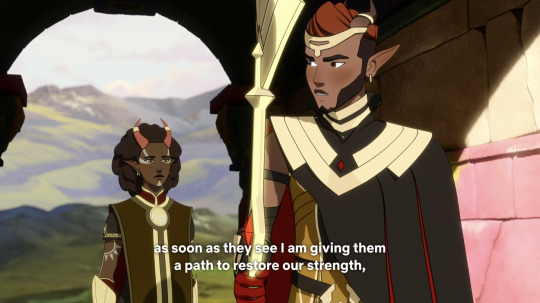
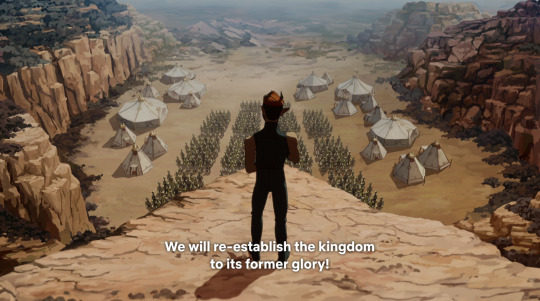
It is worth noting, then, that the status quo in the beginning of TDP is:
Humans are either magic-less or use dark magic
The border is closed/guarded fiercely
Elves and humans live entirely separately and are enemies
Xadia (Runaan) wanted to take the egg of the Dragon Prince back and to kill King Harrow regardless
Meanwhile, "leftism supports and tries to achieve social equality and egalitarianism through making radical changes to society. The left is traditionally associated with revolutionary politics, which support an abrupt, rapid, drastic change in society. This doesn't necessarily have to be combined with progressivism [...] but when I'm talking about revolutions here, I'm discussing revolutions with the purpose of making society more egalitarian."
It is worthwhile, I think, that Rayla immediately defects from Xadia's invasion/assassination of humanity in order to protect and help human princes; she understands that Runaan taking the egg back will not achieve anything meaningful beyond reuniting the prince with his mother, and that more is needed. The trio then assume the responsibility onto their own shoulders. The magic system is also blatantly demonstrated as unfair in S2, even before we know who's responsible beyond 'worldbuilding'. At the same time, the show cautions the idea that killing just one evil/monstrous individual will fix all your problems, or that punitive justice is useful as opposed to more rehabilitative justice / critiquing imprisonment as its own form of violence (great video essay here about prison abolitionist politics in ATLA, or lack thereof).





"One thing that centrism loves is the idea of gradual social change, as opposed to the right's desire for things to stay the same and the left's desire for things to change right here right now. You can think of centrism as the right but more progressive, or the left but more regressive. Centrists support social hierarchy, but with more equal distribution of resources than the right. A big word with centrists is reform, as in reforming institutions rather than abolishing them, as a leftist would say."
While TDP does emphasize that rebuilding from loss and changing the world takes decades of work, that's more so about continuing to change things and having it stick > introducing change. For example, Sunfire elves went from warring with humans to having a large human population within under two years, and the construction of an elf-human city at the border three years within the end of the war. Aaravos and Claudia (antagonists) are working to abolish the Cosmic Order and dismantle the Council, but the protagonists are fighting to stop them due to the two's destructive methods (corrupting the sun and plunging the world into darkness, for ex) while actually dismantling the council through primal magic, reconciliation and working together, etc. The show also has a positive view of Breaking chains and rejecting the past and traditions, rather than being beholden or attempting to reform them.
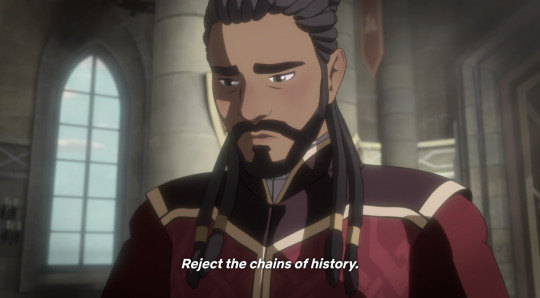

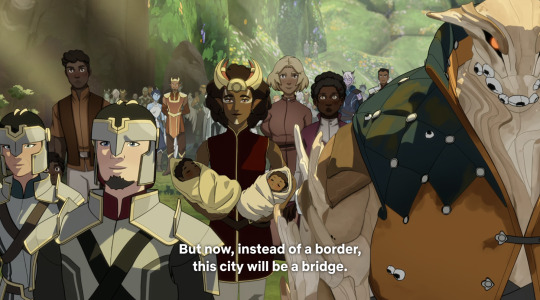
"(Modern) liberalism [as a part of centrism] as an ideology essentially concerns itself with the idea of freedom, where protecting and enhancing individual freedom is the central concern of politics. Modern liberalism believes that the biggest threat to individual freedom is poverty, since it limits the choices people have in life, and prevents them from living to their fullest potential. As such, modern liberals believe that the government should intervene in economic and social issues like poverty or welfare. Modern liberalism still believes in a market economy [...] and is still very much for reform and gradual change in the midst of all of this. So for liberals, revolution is a no-no, and they prefer for things to be peaceful and orderly."
Again, TDP does have an emphasis on freedom, with access to magic standing in as an allegorical 'market of resources' in many ways. The social inequality the show focuses on is humans being born without magic and the alternatives/consequences of it, the harm of Xadia's isolationism, and how Aaravos exploits that inequality through introducing dark magic. However, TDP's only concern is not with freedom or even individuals (re: the Silvergrove's collectivist leanings, 3x09's emphasis on group unity, Sarai's warning of focusing only on removing individuals as a fix to systemic problems or issues).
So while I wouldn't say TDP as a work is focused heavily on revolutionary politics, that's partially because it's not a straightforward oppressor-oppressed narrative (the way Arcane is / seemingly should be) either. Humans were expelled from their homes in Xadia to just one half of the continent (where some humans already lived, and where some elves were likewise forced to leave and abandon important sites, such as the Moon Nexus) but then given entirely free reign. Xadia left them alone, guarding only the border to ensure they wouldn't cross over and kill Xadians for dark magic parts in the post-expulsion 1,000 year interim, as dark magic can make someone powerful enough to kill archdragons and more powerful than elves/humans alike. If anything, the show calls into question the validity of varying degrees of oppression as a justification for killing/attacking civilians, which has more and more made me think about world affairs as of late (i.e. justifications offered by Israel of what is okay in the name of reclaiming a homeland) as a worthy concept more people could fare with getting through their heads, dark magic as a cautionary tale against viewing people and the land as resources only, etc etc.
I am also not, to be clear, saying that there no elements of centrism in TDP, political theory is not my primary background by any means, but that TDP presents an undeniably & primarily centrist narrative feels wonky as a claim to me, even without taking into account such an adamant rehabilitative stance, those responsible for the unfair magic system being the endgame antagonists, and with 3 seasons to go to explore things further. Even by the end of s7, we see humans returning to Xadia with protagonists advocating for the resumption of land and lives sharing (Amaya, a human queen of the Sunfire elves; Evrkynd as an elf-human city; "You can't tell humans to leave, they've built friendships, made families") and most of the pre-series status quo continuing to be upheaved by the core protagonists.
#analysis series#sort of#analysis#god plz don't be weird on this post#tag ramble#i also think it does a good job at presenting a 'both sides' conflict that is 1) genuine and 2) not actually centred on whiteness#whereas most ones falter bc it is about whiteness if only allegorical and. yeah#the video itself was very interesting bc i still haven't watched arcane but i can like#see tdp's shadow with it#hextech = dark magic / viren = silco / vander = harrow#but every time tdp neatly sidesteps like vander argues fighting for change was wrong bc it got violent#tdp allows trio (esp ezran) to engage in violence to protect change#but are warded against pursuing revenge (harrow's actual regret) and losing sight of your desire for change
55 notes
·
View notes
Note
You used Rex Lapis vs Zhongli as an example but I don't see anyone having made a case for Neuvillette from Genshin Impact as a fuckable dragon.
He has proof of dragon-ness (the blue rhinophores in his hair, he's a water dragon. Arguably his weird eyes too) and is in-lore a dragon who was stuffed in the body of a human (potentially via divine intervention trying to nerd him? Can't remember if a reason was stated?) He is also the collective father figure of a race that is described to be the daughters of a dragon.
Sorry for the essay I'm autistic about dragons and want this man carnally
This mod is actually hyperfixated on Genshin Impact, like this is my jam, so I will actually respond to this in detail.
TL;DR I love Neuvillette and he is a dragon but I am too pissed with Hoyoverse's cowardice regarding dragons to award it by posting an anime man.
Yes, I know that Neuvillette very much is a dragon. Hell, he's shown more dragonness than Zhongli so far. He understands saurians, and once the hydro archon... left her throne, phrasing as to avoid spoiling people, he took back his reign over hydro. And I love him.
HOWEVER.
My man's dragon form is still a speculation, and I realize I relented and posted some dragons that don't look like dragons, including but not limited to Falin (Dungeon Meshi) who looks more like what we know as chimeras but lore-wise is a dragon, and Dan Heng (Honkai Star Rail) from the same company as Genshin Impact. I did not mind posting Falin because she's a dragon as far as the universe she belongs to is concerned. I minded posting Dan Heng because that's just an anime boy with horns and tail and they are not even committed to the horns and tail! They only show up under specific conditions!
And Hoyoverse keeps including dragons in their universes, giving them a banger lore, and... shying away from making them dragons. Zhongli was famously a shapeshifter but he shed his dragon form to have a mortal life and we only see the corpse he leaves behind. Neuvillette, despite being a honest to god dragon, only gives away his true form in shape of a ladle. The only dragons that were allowed to be dragon-shaped are antagonists, Dvalin and Azhdaha and Durin and the very advanced ancient dragon race that went extinct and the only remaining ghost of that race also being a world quest antagonist before fading away forever!
And, salt to the wound, as if that's not enough...
Mini Durin, whom we pulled out from a storybook, wants to become human. (And he has, though we didn't see what he looks like clearly. To their credit, we did see very clear horns and wings, but Albedo also said he needed time, so he might shed them too.)
And I am not even going to talk about Bailu and Lingsha from Honkai Star Rail.
So, yeah, Neuvillette is a dragon, but I cannot in good conscience post him as the conventionally attractive anime man that he is, especially considering how much of a COWARD Hoyoverse is when it comes to dragons.
#anonymous#mod post#fun fact. mod started playing this game in the first place because they got dragonbaited.
28 notes
·
View notes
Text
youtube
Watership Down - first the film, then the book, is one of the most formative media influences in my life. I’ve written about it briefly, here https://i-blame.tumblr.com/post/69030937937/moniquill-moniquill-kucala-moniquill
but having watched the above video essay, I want to say more.
The first time I saw a deer up close was in my grandfather’s back yard; I was about four years old. I don’t remember the reason that my mom dropped me off at my grandfather’s house for an afternoon, but I know that it was unplanned - because he was in the middle of processing a deer. It had been field dressed, organs already removed, and was hanging by its ankle tendons from the t-shaped steel pole at one end of the backyard clothesline. I was startled, worried, concerned that the animal was hurt. There was blood! There was flesh!
My grandfather responded by calmly explaining what he was doing, step by step. Explaining why he was skinning the deer, and quartering it, taking it from this https://en.wikipedia.org/wiki/White-tailed_deer to this https://en.wikipedia.org/wiki/Venison
He talked about hunting, and about gratitude, and about humans and our proper place in the world - what meant to live in a good way.
By the time my grandfather was cooking tenderloin medallions and plating them up to me with grape jelly (don’t knock grape jelly on meat until you’ve tried it!) and instant mashed potatoes, I wasn’t startled or concerned anymore. I had a deeper understanding of the way the world worked, of my role as a consumer, a predator. Of the responsibilities that entailed. I couldn’t have explained it then, of course, with my 4-year-old mind and vocabulary - but Philosophy had been set into motion. This is a core memory for me.
I did not have nightmares about the butchered deer.
I was six when I first saw Disney’s Bambi. I DID have nightmares about that; between Bambi and The Land Before Time, I was absolutely convinced that my mother was going to die. That I was being presented with these media themes to educate and prepare me for that eventuality. I am the youngest daughter of a youngest daughter, and I have an extended tribal family. My grandfather died when I was six. His was one of many funerals I attended at that age; his generation succumbing to age and illness. I was aware of mortality.
I wasn’t a ‘normal’ child, by the standard of the community that I went to school in. I was too poor, too indigenous, too very obviously autistic (without being diagnosed). I had very different media influences and interests than the other kids at my public school. No one else was deeply obsessed with David Attenborough’s documentaries (Life on Earth 1979, The Living Planet 1984, Lost Worlds, Vanished Lives 1989). No one else had even heard of Dot and the Whale. No one else in my class had Lifeways Lessons classes, because they didn’t have tribes.
I wasn’t terribly interested in most media intended for children; it was boring because it was simple. I didn’t feel motivated to watch Disney movies over and over. Don Bleuth films had more staying power in my mind; An American Tale, All Dogs Go To Heaven, The Land Before Time. More complex stories, stories that confront suffering and death. My mom read me CS Lewis and JRR Tolkein, Jack London and EB White - lots of other stories that were not ‘age appropriate’, stories that were written for People, not Children.
I watched Watership Down for the first time when I was about five, and my mom read the book to me when I was about six. I was not disturbed by the violence, being far more interested in the themes explored in the video essay above. I had, by this time, seen a rabbit skinned IRL. I’d eaten rabbit stew.
I did not have nightmares about Watership Down.
I failed to make friends with the kids at school, for the most part - I primarily socialized with my cousins. In fourth grade (age 9), my class did a unit on tropical rainforests, and I brought in this video: I did not think that there was anything at all controversial about it, but at about 32 minutes in David Attenborough talks about the Guarani people and their traditional ways of life. There’s footage of an unclothed man climbing a tree. His penis is briefly visible. THE CLASS WENT WILD, and the teacher rushed to turn the video off, and I was sent to the office. It caused a school-wide incident, and bringing in videos was thereafter banned. I was deeply, deeply confused by this series of events. The video had come from the public library - how could it possible be offensive? But the incident became a vector of bullying that followed me until middle school - the adults had confirmed to the kids that I had done something taboo, that I was fundamentally wrong in some way. I quietly came to the conclusion that Most People(™) are very stupid and very reactionary, that one has to carefully coddle and explain things to them.
It took me many years to only mostly overcome that conclusion.
Later that same year, I had my first real success in making a childhood friend - someone who came to my house after school and had sleepovers and such. She had transferred from another school and didn’t know I was THE WEIRD GIRL the way my other classmates did. I remember trying to introduce my favorite movies to her, as she introduced her favorites to me. She was a Horse Girl(™) and much more interested in Age Appropriate Girl Things than I was, but we shared a love of My Little Pony - I had a bunch of episodes on VHS, recorded off TV. She thought that https://mylittleponyg1.fandom.com/wiki/Rescue_at_Midnight_Castle was ‘too scary’ and preferred https://mylittleponyg1.fandom.com/wiki/My_Little_Pony:_The_Movie.
I showed her Watership Down. She freaked out about it. It gave her nightmares.
She was, as many people, deeply disturbed by the violence of the film. She had not, at the age of nine, seen animals butchered. She didn’t seem to care about the deeper meanings and philosophical treatises presented; the fact that there was violence and death was too shocking.
I’m not sure how to conclude this essay, except with this: Watership Down is now a litmus test, for me. If a person is aware of it and appreciates it, we’re intellectual compatible. If a person’s whole reaction is shock and disgust and cries of ‘nightmare fuel!’ then we are not.
217 notes
·
View notes
Text
Is it just me, or should we maybe talk about Poseidon's final line to Odysseus, "After everything you've done, how will you sleep at night?" some more?
Thank you to my lovely mutual @glisten-inthedark for making me think even more about the Vengeance saga ending than I already was because there is SO much there to unpack.
Because, like, if you think about that line for more than 2 seconds ... what the hell even is that? Only a complete 180 turn from his "You are far too nice; mercy has a price" attitude.
First and foremost, it feels like such a human thing to say, not least because of his tone. I don't think it is mockery or anything of the sort; it took me a while to notice, not least because he is speaking in a chopped voice due to his injuries, but he actually has the same genuine tone of voice as in his "I can't," one song earlier.
In short, it feels like something someone would say after being shown a glimpse of mortal vulnerabilities and pains, the way that I am convinced he was (for more on that, check out my full torture scene essay; I believe it's one of my best ones.)
Like, my man, are you genuinely asking the guy you specifically tried to make more ruthless how he's going to live with this newfound ruthlessness? What are you so concerned for? That it's too much? Why would you think that? Maybe ... because you've been there yourself? Is that it?
The funniest part to me here is that Odysseus is not nearly as "monstrous" as Poseidon would view him as. Poseidon only sees the "monstrous" actions, which he knows ... but Odysseus, at that point, is so much more than ruthlessness (more on that also in my essay.)
And yet here he is, essentially asking Odysseus, "How will you live in my shoes?" because that's the image that he now has of Odysseus; when he saw Odysseus wield the trident, he saw him in his own shoes, and due to personal limitations, Poseidon cannot comprehend that Odysseus isn't actually committing to a life with his philosophy because he probably doesn't understand that there is a middle way.
Honestly, the more I think about the effects such an exposure to vulnerability would have on Poseidon, the more I worry for him.
Some people point out that this defeat may have ultimately been pointless because the moment Poseidon recovers, he could just immediately come after Odysseus and drown his island or whatever he wants ... He won't do that. I can't tell you why I know this, but I am like 100% sure that he won't.
Physically, he will recover. But emotionally/mentally? My man is f*cked ... and that's putting it lightly. He will feel the effects of this exposure excruciatingly for a long, long time ... Because, in order to fully recover from this, I wager he would have to actually process what happened there and reflect on his own actions in the way that Athena did ... which we all know he won't do.
Athena managed to use Odysseus' confronting her with her own flaw/fear to reflect and grow, which is why she had that beautiful character arc and learned to open her heart. Poseidon? I mean, maybe in a couple centuries, I don't know ...
... If I had a nickel for every time that Odysseus out-topped humbled a god to the point of being forced to confront their own vulnerability, I would have two nickels, which isn't a lot, but it's weird AWESOME that it happened twice. Keep slaying, king; they need it.
#epic the musical#epic odysseus#epic the vengeance saga#epic poseidon#jorge rivera herrans#poseidon epic#odysseus epic#epic musical#yeah poseidon is screwed#i can see a couple ways in which this confrontation might affect him#and none are particularly good#yes one of them is his obsession with odysseus manifesting in a ... *different* way#yes i'm writing a fanfic about that#go check it out if that's your thing haha#epicssay
51 notes
·
View notes